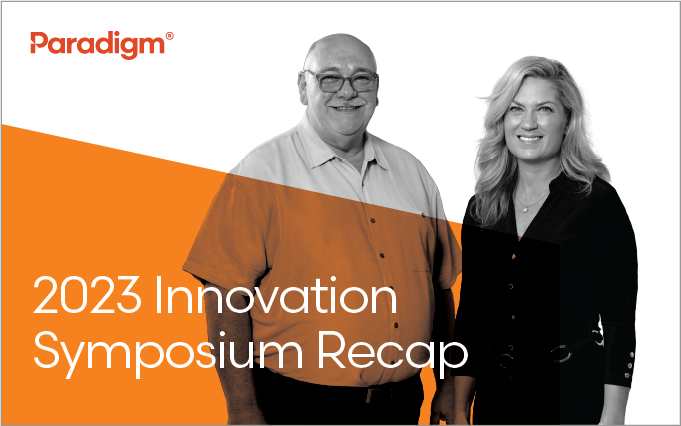11/06/2023

The annual Paradigm Innovation Symposium connects colleagues, partners, and collaborators by exploring thought-provoking topics with some of the world’s most forward-thinking presenters. This year’s event took place October 18-19 in Chicago and focused on “The New World of Work.” The lineup of speakers did a tremendous job educating and expanding our knowledge of how work, workers, and workplaces will change in the near future—and the important role technological advancements can play throughout the transition.
Invisible heroes make a difference
Our opening speaker was Matthew Zachary, a podcaster, pianist, and founder of Stupid Cancer. From being diagnosed with brain cancer at the age of 22, to playing at the National Mall in Washington, D.C. for a crowd of thousands, and starting a podcast with his unique perspective on cancer, Zachary shared a story of hope, perseverance, and forging your own patient-centered path. Matthew’s overarching message was how important care, empathy, and advocacy are to the core of any organization with a mission to help people. The audience also enjoyed Matthew’s piano performance, including original songs drawing from his personal health care journey.
AI-driven workplaces will always need people
The second day kicked off with Professional Mad Scientist and Co-Founder & CEO of Socos Labs Dr. Vivienne Ming. Over the past decade, Dr. Ming has led multiple projects and ventures based on AI, including facial recognition software designed to help reunite refugees with family members, diabetes software to predict future blood sugar levels and prevent hypoglycemic events, and AI-driven neuromodulation to help patients overcome disorders ranging from Alzheimer’s to major depression. In all of these cases and many others where AI is making a difference today, it took a human to identify the ill-posed problem and explore the unknown. While AI is astonishingly good at solving clearly defined, well-articulated problems, Dr. Ming predicts we will continue to rely on human intervention for the foreseeable future to interpret the less-defined, ill-posed problems that call for creativity and the ability to be innovative.
What mindset will the future of work require?
Closing out the symposium on Thursday, Strategic Futurist and Corporate Strategist Nancy Giordano took the audience on a whirlwind tour of the seismic transformations facing the global economy and how people and organizations can prepare. These forces, including new technologies like AI, a changing planet and population, and a growing understanding of well-being and productivity in the workplace, all present both tremendous challenges and exciting growth opportunities. During her presentation, Giordano emphasized the need for workplaces that are less hierarchical, open to change, and consist of people who think creatively to take an active role in their future.
Working together to change lives in a human-centered future
In preparing for what’s ahead, our north star at Paradigm will always be to improve the lives of injured workers and their families. As part of that mission, we were proud to have the opportunity to share Paradigm’s newest HERO Video at the Symposium. This latest installment in a long-running series highlights the inspiring story of injured worker Alexander Borges and the support and care he received from Paradigm clinicians who contributed to his amazing recovery following a catastrophic injury.
For the most serious injuries which can occur in any industry, Paradigm is here to help. To speak to our experts and learn more, contact us or refer a case today.